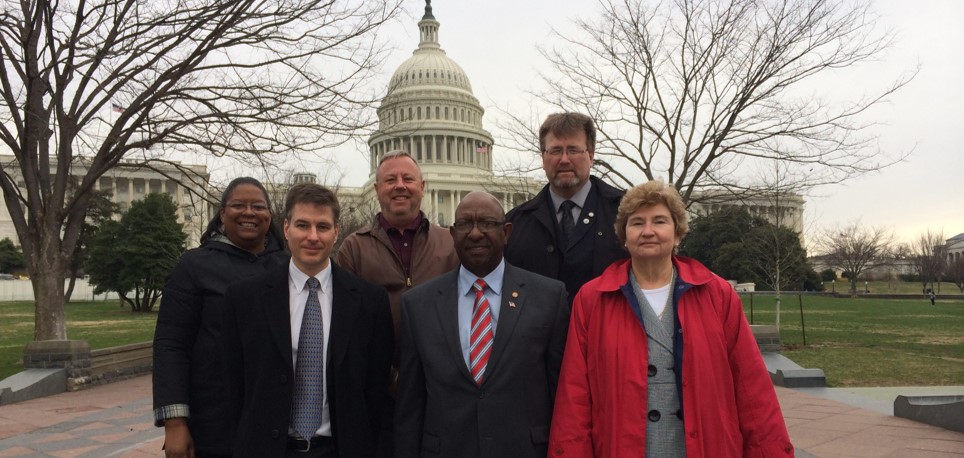Imagine your collective bargaining agreement had language calling for workplace financial awards be distributed “fairly” for bargaining unit employees. How do you measure fair? Or more importantly, how do you enforce fairness? Prior to such language in NFFE Local 1998’s contract, Management Passport Services in the Department of State had long favored itself with regards to financial awards – doling out significantly larger portions to managers rather than the bargaining unit employees.
With contract negotiations opening up in 2009, the bargaining team knew they had to build language on awards parity into the awards article. Led by Chief Negotiator Steve Flory, the Local 1998 bargaining team delivered a new contract. Significant additions included promised a fair distribution of the awards system for all employees, as well as awards data to verify parity.
In April 2011, with the prior year’s awards data late by several weeks, Local 1998 President Rob Arnold requested the 2010 agency statistics. The Agency provided only the amounts for employees, but not managers. Possessing only half of the two-part equation it was supposed to monitor, the Local prepared to take the omission to a hearing.
The arbitration was narrowly avoided when, in 2012, the agency finally turned over the remainder of 2010 awards figures. A review of that data showed that employees were much less likely to receive an award than managers. In some offices, to be a manager was to automatically receive an award.
The average manager’s award in some offices was twice as large as the typical employee’s. Quality Step Increases (QSI), which carry more value over time, were disproportionately going to managers. This QSI imbalance impacted not only employees, but the taxpayers; a QSI to a highly-paid official is more expensive than to a lower-grade employee.
Though the 2010 awards data had just come in to resolve the previously-filed grievance, the 2011 data was now tardy, as well, so Local 1998 filed another grievance. A Local 1998 team headed by Paul Barton spent hours tallying up awards amounts, much of it on their own time.
The matter went before an arbitrator in the summer of 2013, and the Union prevailed. The arbitrator ordered instructed both sides to find a mutually-agreeable resolution.
Though it took months, the Union was able to finally arrange a meeting with the agency. Immediately after the initial meeting, the agency claimed that the Union agreed to a $20,000 settlement that would suffice for all wrongs (meanwhile, actual damages from misappropriated awards were in excess of $1 million, without factoring the long-term benefits of QSIs). It was clear that a “mutually-agreeable resolution” was not in the near future.
By 2014, passport employees were still waiting their belated awards recognition. With the two sides unable reach agreement, the arbitrator requested that each side make its case for what the appropriate remedy should be.
The Agency now surprisingly claimed that the award amounts it had previously provided for 2010 were inaccurate; that the totals for 2010 and 2011 were actually only a fraction of the half-million dollars it handed out other years. Thus, it argued, the amount of money needed to correct the imbalance was also much lower. The Agency further argued that any time the Union did not file a grievance (as was the case with prior years’ awards) was an acknowledgement that Management was following the contract.
It did not take long for the arbitrator to make clear that the agency was the loser of the arbitration and would be held accountable for the arbitration costs as prescribed in the contract. The matter of the awards statistics, though, was a tougher nut to crack. Local 1998 President Arnold pointed out that his 2010 award amount, dug up from an old bank statement, was for a dollar amount the agency’s “corrected” set of figures said was never handed out.
Still insisting that the data showing a small disparity was accurate, the Agency challenged the Union to bring in an observer to verify the data contained in its electronic performance record-keeping system. Philip Snodgrass, the late NFFE Associate General Counsel, volunteered to be the Local’s observer. The day before Snodgrass was due to arrive at the Agency, Management representatives stated that new details cast doubt on their “corrected” set of numbers. The Agency agreed that the original set of data was correct, after all.
The agency had finally run out of tricks, and the arbitrator moved ahead in awarding NFFE Local 1998 bargaining unit employees a sum of $125,000 to correct award imbalances for 2010 and 2011. Further, it was determined that the agency was to give 25 current bargaining unit employees QSIs.
“While we have spent years getting to this point, the fight is not yet over,” said NFFE Local 1998 President and National Vice President Rob Arnold. “The 2014 awards data has been released, showing the same inequality towards employees that previous years did. Local 1998 has been forced to file yet another grievance to correct the disparity. We hope the Agency willingly abides by the contract and commits to awards fairness.”
NFFE Local 1998 is the national Local representing employees in the Department of Passports & International Travel within the Bureau of Consular Affairs of the Department of State at Passport Agencies across the country.

Local 1998 members fighting for federal employees on Capitol Hill last fall


